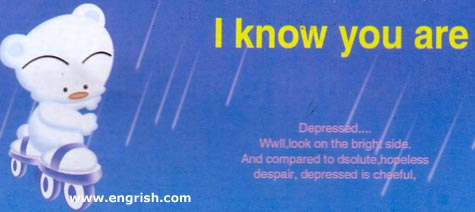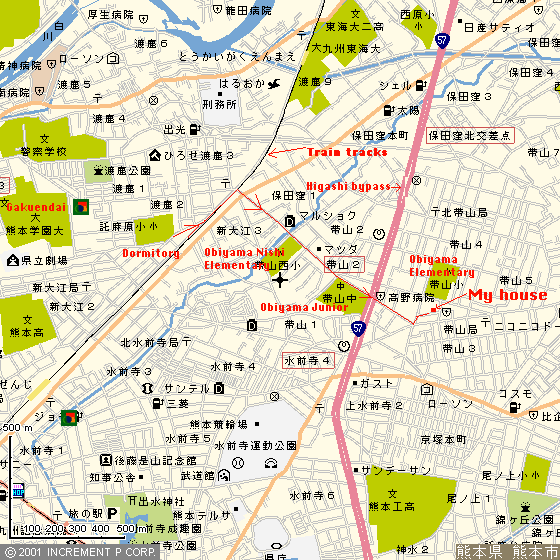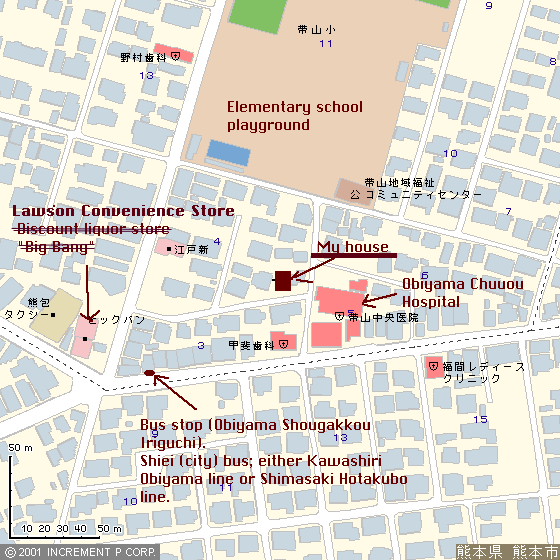I am reminded of a rule at the junior high school near my house. この関連で、家の近くの中学校の校則を思い出しているところです。Even with parental consent, "sleepovers" are prohibited. 親の同意があっても、友達の家に泊まることができません。
2009/05/22
Paternalism
We have talk about the university's decision regarding influenza. 新型インフルをめぐる大学の判断について話しました。One point I am interested in is the extent of the university's authority. 私の大学の権限の範囲に興味があります。For example, does the university have the authority to "order" students who are taking a year off to go abroad to return to Japan -- even when the students have arranged their studies entirely on their own? 例えば、「私費留学」をしている人たちに対して、はたして「帰国命令」を出す権限があるのだろうかと思います。
Special thanks to Ai, Komugi, and Tomomi
I would like to thank everyone who helped get ready for the party on Saturday and who helped clean up. 土曜日のパーティーの準備や後片付けを手伝ってくれた皆さんにお礼を言いたいと思います。In particular, Tomomi, Ai, and Komugi worked very hard and long to prepare all of the delicious food. 中でもKomugiさん、Aiさん、Tomomiさんが長時間、一所懸命においしい料理の準備をしてくれました。Thank you so much! 本当にありがとうございました。
Corporal punishment
Recently, there was a supreme court decision about an instance of corporal punishment that occurred in Amakusa in Kumamoto. 最近、天草で起きて体罰事件に関する最高裁の判決がありました。The court ruled that the rough treatment of the second grader (grabbing him by the front of the shirt and pushing him up against a while yelling at him) did not constitute corporal punishment. 最高裁は講師の行動が体罰に当たらないとの判断を下さしました。Perhaps corporal punishment would be an interesting topic of discussion. 体罰について議論するといいかも知れません。
Here's the address of an article in English:
日本語でこの判決について書かれた記事へのリンクを貼ります。
Jury system
Since we had many different opinions about the jury system last week, I think this topic would be a good candidate for a debate topic. 先週、裁判員制度に関するいろいろな意見がありましたので、ディベートのテーマとしてはいいかも知れないと思っています。In particular, I was interested in different levels of trust toward judges. 私は裁判官を程度信頼しているかに関する違いに特に興味を持ちました。I also thought it was interesting that many of the foreign students had heard about Japan's high conviction rate but that most of the Japanese students had not. また、留学生の多くは日本の有罪判決の割合の高さについては知っていましたが、日本人の皆さんの方はあまりにそのことについて知らなかったことは興味深いと思いました。
2009/05/15
Discussion Questions
Here are some questions I would like to discuss in small groups today. 次の質問を糸口に少人数のグルーブでのディスカッションをしてほしいと思います。
- Do you and your friends tell each other jokes (stories that end in a punch line)? 友達同士でジョック(落ちのある話)を言い合うことはありますか?
- Do you think juries are a good idea? 裁判員制度はいいと思いますか?
- Would you prefer that someone who works in a convenience store where you shop occasionally treat you formally (as a customer) or informally (more like a friend). ときどき買い物をするような店の店員にはどちらのような対応が自分にとって気持ちがいいとおもいますか?「お客さん」として丁寧に接するような対応、それとももっと友達や知り合いのような接し方?
- Which of the following is most important to you when you choose a career? 就職する際、あなたにとってもっても重要なのはどれでしょうか?
- Stability 安定 < --- > Possibility of advancement 出生の可能性
- Reasonable working hours ほどほどの労働時間 < --- > Salary 給与
- Interest in work 仕事に対する興味・関心 < --- > Salary 給与
- Generally speaking, do you approve or disapprove of the idea of "ladies first"? 一般に置いて、「レディーファースト」には賛成ですか、反対ですか?
- In your lifetime, have you ever experienced or witnessed discrimination or unfair treatment based on race, gender, sexual orientation, etc.? あなたのこれまでの人生において、人種、ジェンダー、性的指向等による差別またはそアンフェアだと思った対応を自分自身が受けてことがあるか、それともそうした差別を目の当たりにしたことはありますか?
Research assignment
By the 29th of May, post a message on your blog in which you do the following. 5月の29日までに次の内容のメッセージをブログに投稿してください。
- Present a quote from a book or article about a culture, preferably one that is represented in this class. 本や記事からの文化(できればゼミのメンバーの中にその文化圏出身者がいる方が望ましい)に関する文を引用してください。For example, a short statement like "Japanese are ***" would be fine. 例えば、「日本人は***」のような短い文の引用でいいです。
- Include a citation for the quote. For example, if you are quoting from a book you would need to include the author, book title, publisher, year of publication, and the number of the page on which you found the quote. 出典を明記してください。例えば、本なら著者名、題、出版社、出版年、文があったページ番号を必要があります。
2009/05/12
Boke and Tsukomi
Here's an example of boke and tsukomi in an old American comedy duo (昔のアメリカの漫才における「ぼけ」と「突っ込み」の例です):
2009/05/08
Swine flu
Swine flu and the university's response was a topic of discussion last week. 先週はブタインフルエンザや大学の対応が話題になりました。Since then, some articles about Gakuendai's response have been published in English (and Dutch!). 学園大の対応に関する英語やオランダ語(!)の記事がありましたので、紹介しましす。
More topics
Here are some more topics that came up in your blogs:
- Protecting wildlife (wolves, whales, tuna, etc.)
- Mottainai (specific examples such as bathing in Australia)
- Symbols as fashion
- Humor ("A cruse ship hit an iceburg and . . . ")
Engrish
Ash posted about symbols. Ash君が象徴について投稿しました。His post reminded me of a site called Engrish. 投稿を見てEngrishというサイトのことを思い出しました。Here are some images from that site. そのサイトからの写真をすこし紹介します。 I think they are similar to what Ash wrote about because, here too, the meaning seems to be much less important that the appearance. Ash君が指摘したこととの共通点は、意味よりもファッションや飾りとしての役割が重視されているようだということです。










Media critique
During our last class, I showed a video of a show called "Cool Japan." 前回の授業でCool Japanという番組のビデオを見せました。The show was about mottainai. 番組のテーマは「もったいない」でした。I said that the way the foreigners in the show spoke English to people on the street, who should not be expected to be fluent in English, struct me as rather odd. 番組に出ていた外国人が町の人(英語が得意とは予想されないような人)に英語で話しかけていたことが気になると言いました。Over the holiday, I started to prepare a video critique of this that makes the reasons for my concern clearer. ゴールデンウィークの間、Cool Japanにおける英語の使い方の問題点を分かりやすく説明するビデオを作り始めました。I'm not done with this so I can't show it to you yet, but when it's finished I'll show it in class and also post it to YouTube so I can put it on this blog. まだ作り終わっていないので見せることができませんが、作り終わったら授業でも見せようと思っていますし、また、YouTubeに出してからこのブログにも載せようかと考えています。
By the way, I did a video critique of another Japanese TV show called "Koko ga hen da yo, Nihonjin" (one that is no longer on the air) earlier this year. ところで、今年の春に「ここがへんだよ、日本人」を批評するビデオを作りました。I've put that on YouTube. YouTubeで公開しました。Here it is:
By the way, I did a video critique of another Japanese TV show called "Koko ga hen da yo, Nihonjin" (one that is no longer on the air) earlier this year. ところで、今年の春に「ここがへんだよ、日本人」を批評するビデオを作りました。I've put that on YouTube. YouTubeで公開しました。Here it is:
2009/05/01
Party
Don't forget that the party at my house will be on Saturday, May 16th. 5月16日(土)に我が家でパーティーをすることを忘れないでね。
More topics from your blogs
There were many interesting comments and topics for discussion in your blogs. 皆さんのブログには面白そうな話題やコメントがたくさんありました。Here are some that I thought we might talk about. いくつかをピックアップしてみたいと思います。I don't have time to explain them so I'll just list them for now. 説明を書く時間がありませんので、とりあえずリストアップするだけにします。
- Mottainai (もったいない)
- Staring at foreigners (外国人をじろじろと見る)
- Tipping (チップの習慣)
- Working hard(長時間労働)
- Modesty (謙遜)
- 「つまらないものですが・・・」("This is a lousy gift but . . .")
- 「親ばか」("Stupid parents")
- Sincerity (何でも言う、という訳ではない)
- アニメ文化 (Anime culture)
- 留学の予定 (Plans to study abroad)
- 「しちゃかちゃ」(Kumamoto dialect)
- Cuteness (かわいさ)
- Humor (笑いの取り方)
- "Ladies first" (「レディーファースト)
- 騒音(noise)
Subscribe to:
Comments (Atom)

